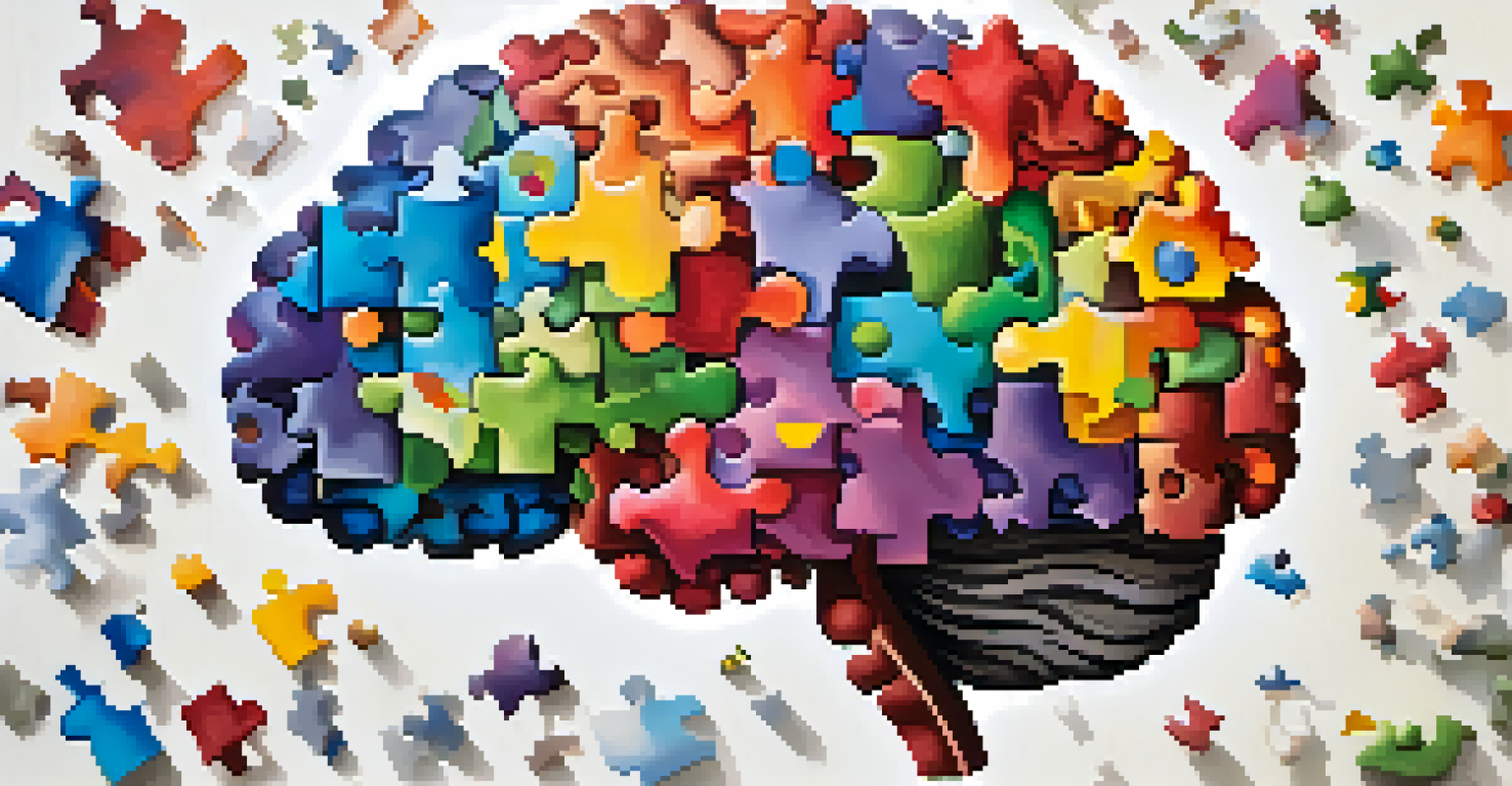The Lasting Effects of Substance Abuse on Brain Function

Overview of Substance Abuse and Brain Health
Substance abuse refers to the harmful or hazardous use of psychoactive substances, including alcohol and illicit drugs. Over time, these substances can significantly alter brain function, leading to both temporary and permanent changes in cognition and behavior. Understanding these effects is crucial for recognizing the broader implications for individuals and society.
Addiction is a family disease. One person may use, but the whole family suffers.
The brain is a complex organ that manages everything from basic survival functions to intricate decision-making processes. When substances like alcohol or opioids enter the system, they hijack the brain's natural communication pathways, disrupting normal signals. This disruption can lead to a range of issues, from impaired judgment to emotional instability.
Recognizing the signs of substance abuse and its impact on brain health is the first step toward recovery. It highlights the importance of awareness and education in preventing substance-related disorders, which can have devastating effects on individuals and their loved ones.
How Substance Abuse Alters Brain Structure
Chronic substance abuse can lead to noticeable changes in brain structure. Research has shown that prolonged use of drugs can shrink areas of the brain responsible for decision-making, impulse control, and emotional regulation. This can result in a variety of cognitive deficits and behavioral issues.

For example, alcohol abuse has been linked to a reduction in the size of the hippocampus, an area critical for memory and learning. Similarly, stimulant drugs like cocaine can damage the brain's reward system, making it harder for individuals to feel pleasure from everyday activities. These structural changes can have a long-lasting impact even after someone stops using substances.
Substance Abuse Impacts Brain Health
Substance abuse significantly alters brain function, leading to both cognitive deficits and behavioral issues.
These alterations underscore the importance of early intervention. By addressing substance abuse issues before they escalate, we can help preserve brain function and improve overall quality of life for affected individuals.
Neurotransmitters and Substance Abuse
Neurotransmitters are chemicals that transmit signals in the brain, playing a vital role in regulating mood, behavior, and cognition. Substance abuse can significantly disrupt this delicate balance, leading to an overproduction or depletion of these essential chemicals. Drugs often mimic or inhibit natural neurotransmitters, leading to altered brain chemistry.
Recovery is not a race. You don't have to feel guilty if it takes you longer than you thought it would.
For instance, opioids bind to the brain's receptors, producing feelings of euphoria and pain relief, but they can also lead to decreased levels of dopamine—the neurotransmitter associated with pleasure. This can create a vicious cycle where individuals need to consume more of the substance to achieve the same effect, ultimately leading to addiction.
Understanding the role of neurotransmitters in substance abuse helps clarify why recovery can be so challenging. As individuals work toward sobriety, their brains must recalibrate and restore normal neurotransmitter levels, a process that can take time and support.
Cognitive Impairments Due to Substance Abuse
Substance abuse can lead to a range of cognitive impairments, including difficulties with memory, attention, and problem-solving. These cognitive deficits can affect daily functioning, making it challenging for individuals to maintain employment, relationships, and overall quality of life. The extent of these impairments can vary depending on the type of substance used and the duration of abuse.
For example, research has shown that heavy alcohol use can result in deficits in executive functions, such as planning and decision-making. Similarly, long-term marijuana use has been associated with memory issues and decreased attention span. These cognitive challenges can persist long after an individual has ceased substance use, highlighting the need for comprehensive treatment strategies.
Early Intervention is Crucial
Addressing substance abuse early can minimize long-term cognitive impairments and improve recovery outcomes.
Addressing these cognitive impairments is essential for recovery. Cognitive rehabilitation therapies can help individuals regain lost skills and improve their ability to function in everyday life, fostering a sense of independence and confidence.
Emotional and Psychological Effects of Substance Abuse
The emotional and psychological effects of substance abuse can be profound. Many individuals turn to drugs or alcohol as a way to cope with stress, anxiety, or trauma, but this can lead to a cycle of dependence that exacerbates underlying mental health issues. Substance abuse can contribute to conditions like depression, anxiety disorders, and even psychosis.
Moreover, the stigma associated with substance abuse can make it difficult for individuals to seek help. Feelings of shame or isolation can further compound emotional distress, creating barriers to recovery. It's essential to foster a supportive environment where individuals feel safe discussing their struggles and seeking treatment.
Integrating mental health support into substance abuse treatment is crucial for holistic recovery. By addressing both the emotional and physical aspects of addiction, individuals can build resilience and develop healthier coping strategies.
The Importance of Early Intervention
Early intervention in substance abuse is key to minimizing long-term effects on brain function. The sooner individuals receive support and treatment, the better their chances of recovery without significant cognitive impairments. Programs focusing on education, prevention, and early treatment can help individuals make informed choices and reduce the risk of developing severe addiction.
For example, school-based programs that educate students about the risks of substance abuse have shown promise in reducing usage rates among adolescents. Similarly, community outreach initiatives can provide resources and support for those struggling with addiction before it escalates.
Recovery Requires Holistic Support
Successful recovery from substance abuse involves rebuilding brain function through physical, emotional, and cognitive strategies.
Investing in early intervention not only benefits individuals but also society as a whole. Reduced rates of substance abuse can lead to lower healthcare costs, decreased crime rates, and healthier communities.
Recovery and Rebuilding Brain Function
Recovery from substance abuse is a journey that involves rebuilding brain function and restoring overall health. While some cognitive deficits may improve over time, others may require targeted interventions to address. Engaging in brain-healthy activities, such as exercise, mindfulness, and cognitive training, can facilitate recovery.
For instance, physical exercise has been shown to boost neuroplasticity, the brain's ability to reorganize itself by forming new neural connections. This can be particularly beneficial for individuals recovering from substance abuse, as it can enhance learning and memory. Additionally, mindfulness practices can help regulate emotions and reduce stress, further supporting cognitive recovery.

Ultimately, recovery is a holistic process that encompasses physical, emotional, and cognitive well-being. With the right support and strategies, individuals can regain control of their lives and rebuild a healthier relationship with themselves and their environment.